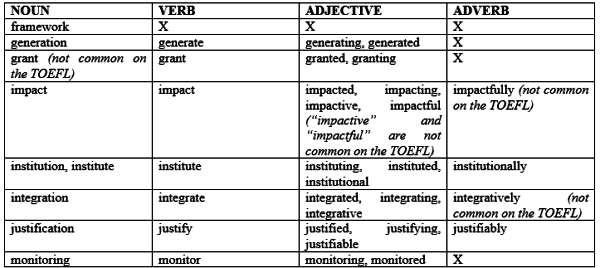So, we’re now at the fourth study of vocabulary words from the Magoosh TOEFL Vocabulary PDF. I’m going over these words in alphabetical order. This time around, we finish up words beginning with “f,” and go all the way through to hard words beginning with “m.”
Like the last three posts, this post will take a deep look at each word, exploring different word forms, definitions and word uses. And as always, the post will be followed by a Magoosh Comics review, with mnemonic comic strips to help you remember all the word forms.
Difficult words 25-32: Different suffixes, different word forms
Below is a list of hard words 25-32: “framework” through “monitor”
Suffixes that change the form of the words:
Nouns: -ion, -ing
Verbs: -ate, -ify
Adjectives: -ed, -ing, -ful, -ive, -able
Adverbs: -ly

Word explanations (meant to go with the definitions from the original PDF)
- Framework
Framework means structure. It can mean a physical structure, such as the framework of a building. Or it can mean the structure of an idea, story, or argument. For example, the framework of a five-paragraph essay is an introductory paragraph, three body paragraphs, and a concluding paragraph. A framework refers to the overall design of something. The smaller details in a building or an essay are inside the framework and are supported by it. But these smaller parts would not be considered to be part of the framework.
- Generate
To generate means to create, produce, or make something. Generate most often refers to making a substance or commodity, such as water, electricity, or money. However, it can sometimes be used to refer to a more finished product. You could, for example, say that I generate blog posts for Magoosh. The noun form of generate is generation, as in “my generation of blog posts for Magoosh,” or “the generation of electricity by the power plant.” You could describe electricity from a power plant as generated electricity, and the plant itself could be described as an electricity generating.
- Grant
Someone grants something when they give something that has been asked for. Grant can also mean to agree that something is true. In this second sense, there is still a meaning of giving; if you grant that something is true, you are agreeing with something that someone else wants you to agree with. As in “I’ll grant that your idea makes sense.” Grant can be a noun, too. In that case, it refers to money that is given after someone formally requests it. Facts that are agreed with upon request and things given upon request are granted things that come from granting people or granting
- Impact
As a noun, impact refers to a forceful hit against something, or the effect something has. As a verb, impact means to hit something hard to have an effect on something. Something that is affected or hit is impacted by an impacting Something that has a big effect or hits something with force could be described as impactive or impactful. An action that causes something to be hit or affected is an action that is done impactfully.
- Institute
Both institution and institute refer to a group, organization, or place that has a specific purpose. A university in an institution/institute of higher education. To institute something means to start something formally. For example, a university could institute some new rules for students, or someone who wants to lose weight could institute a personal program of diet and exercise. In those examples, the set of rules and the personal health program would be instituted things, done by an instituting university and an instituting Something related to an institute/institution would be described as institutional. And if something is done by an institute or institution, it is done institutionally.
- Integrate
To integrate can mean to become part of something. For instance, you could say that you will integrate into your campus community after you pass the TOEFL and get accepted into school. Integrate can also mean to combine two or more things into one unit. So you could also say that your life on campus will integrate you into a learning community. Integration refers to two things— the act of joining things together into one unit, and the state of being together in one unit with other things. You could further state that the university’s integration of different students into one community is a good thing, and that you look forward to your on-campus integration. In this case, you will be an integrated student, the campus will be an integrated campus, and the university will be the integrating The whole experience will cause integration and be characterized by integration, so you could say your experience studying in the US will be a very integrative experience. To use an adverb, you’ll experience life in the US integratively.
- Justify
You justify something if you give a good reason for it. The act of justification is generally done when something appears to be bad or unnecessary. To give an example, to justify living in a really big house if you don’t have a family, you could say that you often have houseguests. Then the house and the money you spend on it would be justified. The justifying reason would be your house guests. You and your houseguests would be happy and find your use of a big house justifiable. You would tell people that the money you spent on the house was spent justifiably.
- Monitor
Monitor means to watch the changing quality, progress, or actions of a thing or person. Someone who does monitoring in this way is called a monitor. As just one example, a classroom teacher is a monitoring school official who watches a monitored group of students.
Previous posts in this series:
- TOEFL Vocabulary Study: Hard Words, Part 1
- Magoosh Comics: Hard TOEFL Words, Part 1
- TOEFL Vocabulary Study: Hard Words, Part 2
- TOEFL Vocabulary Study: Hard Words, Part 3
- Magoosh Comics: Hard TOEFL Words, Part 3






Leave a Reply